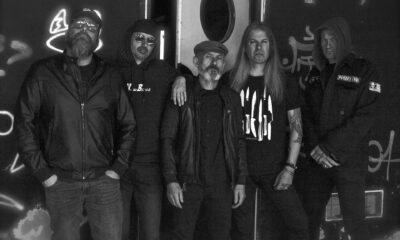Interviews
Interview with Dew-Scented drummer Marc Andree and vocalist Leif Jensen
Drummer Marc Andree and vocalist Leif Jensen of the thrash metal band Dew-Scented spoke with me recently about their latest CD, Invocation. Dew-Scented lay down some serious thrash metal on this disc and fans of the genre would be remiss if they did not check this one out; it is a powerful, all out neck-snapping affair. Here is what the guys had to say about Invocation and the band in general.

Drummer Marc Andree and vocalist Leif Jensen of the thrash metal band Dew-Scented spoke with me recently about their latest CD, Invocation. Dew-Scented lay down some serious thrash metal on this disc and fans of the genre would be remiss if they did not check this one out; it is a powerful, all out neck-snapping affair. Here is what the guys had to say about Invocation and the band in general.
Now that your brand new CD, Invocation, is complete, how do you feel about it? Are you satisfied with the outcome?
Marc: Yes, we are all very satisfied with how the album turned out. It was the first time Dew-Scented recorded an album in this line-up, so we really didn’t know what to expect. But it turned out much better than we could have ever hoped. The chemistry between us was very good and it was a lot of fun to make the record. Surely there where some little fights in the studio, but this is normal throughout the creative process as a collective, I think. Personally, the album really means a lot to me; because it was the first time I have recorded an album with Dew-Scented. Because the band made really good albums before with different members, we had to work real hard to stay on that level or to even write better songs than before (what the Dew-Scented fans have to decide). So it finally is a real good feeling and it makes me proud to hold the CD in my hands.
Leif: Absolutely, I fully agree with Marc. I think the album represents the band in a great way and also presents Dew-Scented in a very fresh and dynamic way. I think it is a great step forwards again from Incinerate, especially considering the changes within the band structure and the rough time we faced in 2007/2008. All good here now.
What was the writing process like for this CD? Did you guys all write together? How long did it take?
Marc: The music was written by all of us. Most times the guitar-players come up with a riff or a basic structure and we put together the songs with the whole band. I think, there is only one song, which is written from the beginning to the end by only one person and that is “On The Brink” (Bonus Track in Europe) by Martin. When the structure of a song is finished Leif comes up with the lyrics. So, all lyrics are written by him. So you can say the instrument-players are responsible for the music, Leif is the one who puts the lyrics on top of it. I think we started with the song writing for the first song at the end of December 2008. So it took more or less a little more than one year to write the songs of the new album.
Leif: I mean, we recorded a total of eighteen tracks for the Invocation session, so it was a lot of material and good flow when we wrote. The good thing is also that all of the material was worked on between all members in the rehearsal room, so it’s definitely ‘playable’ all the way through, which will be really good for live shows in the end.
The name of the band, Dew-Scented, is interesting to say the least and sounds as if there is a story behind it. Where did the name come from and what is the story?
Marc: This is a question, our singer Leif can answer better than me. All I know is that the name depends on a short-story by Edgar Allen Poe. As far as I know, Leif read a short-story by Poe in the 90’s during the time he was searching for a band name. There he found the words and thought that Dew-Scented sounds quite inventive and obscure.
Leif: Well, I don’t even know if that’s true with Poe but it’s been mentioned since the origins of the bad that ‘it might have been’ taken off a piece by Poe. I don’t even know where I spotted that term but I thought it was pretty enigmatic and individual, so it got stuck with me. Everyone seemed to like it when we first spoke about it, so we simply went with it. We liked the fact that it wasn’t the average extreme Metal expression, even though it might have not been stylistically easily suitable, etc. We wanted something that stands out and that maybe one day only represents this band. And I think for ‘those who know’ whenever they hear the name, they will think of this band, right?
How did you end up picking Invocation as the title for the name of the album?
Marc: As you surely know, the title of every Dew-Scented album starts with the letter “I.” We wanted to continue with this on the new album as well because it’s kind of a trademark of the band. Before even thinking about the album’s name, we wrote “The Invocation” as the third or fourth song of the session in the summer of 2009. A half year later, as we were thinking about a title for the album and about a 1,000 proposals later, we remembered the title of song we wrote earlier on. We liked the apocalyptic vibe of the lyrics, we liked the meaning of the word, so we finally took it. To be honest, first I thought that “Invocation” maybe sounded a little bit to Death-Metal. But now, especially when I look at the title in combination with the artwork, I’m really happy with the decision.
What were your main inspirations when writing for Invocation?
Marc: As I said before, the driving force for us to work as hard as possible on the new songs was the aim to write the best album we can as a more or less newly formed band, because the previous albums were pretty good. On the other hand we didn’t look back and didn’t think about how we could write songs in the typical Dew-Scented formula. But it was clear from day one that we would try to write the most brutal Thrash-Songs, we’re able to write. It might sound strange, but in some way or another we inspired ourselves by getting to know each other, because Leif, Alex and me never made music together with our two guitar-players Michael and Martin before. So this all was an experiment which could succeed or fail. And that was an inspiring and exciting situation somehow. Luckily the experiment succeeded!
I think the song that stuck out the most to me is the last one, “Slaves Of Consent”. What is the story behind that one?
Marc: The main riffs of the song were written by Martin. He also came up with the idea how to start the song until the first chorus kicks in. I think this is one of the songs, which took the most time to write. For example, we changed the whole groove-part in the middle of the song some weeks after we “officially” finished the song, because at a certain point we thought that the former groove-part does not work. And finally I can say it was the right decision. From that moment on, we wrote the long and groovy end-part of the song, all of us were sure, that this song is the perfect closing of the album. Also Leif’s lyrics about mass-conformity are great.
Give us some insight into the album lyrically. This is a super pissed off sounding record.
Leif: Well, there is a little bit of everything that’s bad and ugly in my everyday reality in there. Lyrics for extreme Metal songs are an awesome way to vent and release negative emotions. I use this opportunity to the maximum on Invocation and pretty much rant about everything that touched me in the process. There are different subjects like religious madness (“Have No Mercy On Us”), modern society degeneration (“Artificial Life”) or nuclear warfare on (“A Critical Mass”) that triggered the writing but also a rather “stand up and fight” themed track like “Arise From Decay”. It’s tough to give an easy and superficial overall reply here, as every song stands on its own lyrically, yet there is a common apocalyptic atmosphere that unites the tracks for a full-on “Invocation”.
How do you feel about file sharing, Napster and things like that?
Marc: As I have never downloaded any album for free, I don’t really understand how somebody can think that it’s okay to get your music without paying the artist or the company who pre-financed and produced it in any form. And because of the dimension this all currently takes place through the internet, it’s something different than copying a tape to your friend or burning a CD. I think big concerns like for example SONY or EMI won’t go bankrupt because of illegal file sharing, but for small independent companies this situation really is a problem, because they lose money that they could have invested in other bands or projects. And I think this loss of money will change the music-business in a negative way, not so much the big-players, but musical subcultures like Heavy-Metal, Alternative, Punk, etc, where you don’t have as much big money and resources as in popular music.
Leif: I personally actually think it’s hurting everyone, not only the small players. I view the internet as a wonderful promotional platform for artists as well as a way to communicate directly with those who like your music. But I would like to agree with Marc that I have little to no understanding or respect for those who claim to be “fans” of a certain band, while they steal their music and due income. I think the problem (as with a lot of other aspects of modern society) is the lack of moral. You know, the “I wanna own it all but not have to do anything for it” attitude is not only affecting the music business. Since most people, in very egoistic behavior, don’t seem to see it as ‘wrong’ to start with when they download records, it will be a tough process to make this development change.
What is the toughest lesson you ever learned in the studio and on the stage?
Marc: I think, the toughest lesson you learn is actually when you record in a studio for the first time ever. Before, you maybe think that you are well prepared. But when you start recording you suddenly recognize that your playing abilities aren’t as good as you thought in the rehearsal room because you hear your instrument much better than in your rehearsal-place or on a shitty tape-recording. That was the awareness I took with me, when I recorded the first demo with my first band. Before the next studio-visit I surely spent some extra time on rehearsing the songs. The most important lesson for playing live shows surely is the awareness that you have to bring your own sound engineer, if possible, this is really important. Equally how good you play your instrument on stage or how intense your show is; if the sound is good the crowd reacts positively to the concert. I think the sound engineer is an adequate band member, not less important than the singer, the guitar-player, the bass-player or the drummer.
How much roadwork do you expect to be doing this 2010?
Marc: We just played a string of shows with Bolt Thrower last month. In the summer we will play a lot of festivals in Europe. At the moment we are planning a tour for the fall or winter. There is nothing concrete yet, so visit our internet-platforms for news.
Any closing words?
Marc: Thank you very much for giving us space in your magazine! To all the thrashers out there: check out our new album Invocation! It definitely shreds!
-

 Music6 days ago
Music6 days agoTake That (w/ Olly Murs) Kick Off Four-Night Leeds Stint with Hit-Laden Spectacular [Photos]
-

 Alternative/Rock7 days ago
Alternative/Rock7 days agoThe V13 Fix #010 w/ High on Fire, NOFX, My Dying Bride and more
-

 Alternative/Rock2 weeks ago
Alternative/Rock2 weeks agoA Rejuvenated Dream State are ‘Still Dreaming’ as They Bounce Into Manchester YES [Photos]
-

 Features6 days ago
Features6 days agoTour Diary: Gen & The Degenerates Party Their Way Across America
-

 Culture1 week ago
Culture1 week agoDan Carter & George Miller Chat Foodinati Live, Heavy Metal Charities and Pre-Gig Meals
-

 Music1 week ago
Music1 week agoReclusive Producer Stumbleine Premieres Beat-Driven New Single “Cinderhaze”
-

 Alternative/Rock1 week ago
Alternative/Rock1 week agoThree Lefts and a Right Premiere Their Guitar-Driven Single “Lovulator”
-

 Alternative/Rock2 weeks ago
Alternative/Rock2 weeks agoDeath Wishlist Are Fiery and Fierce with Their “I Get Bored” Video Premiere
















